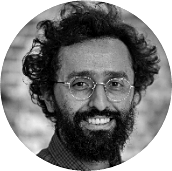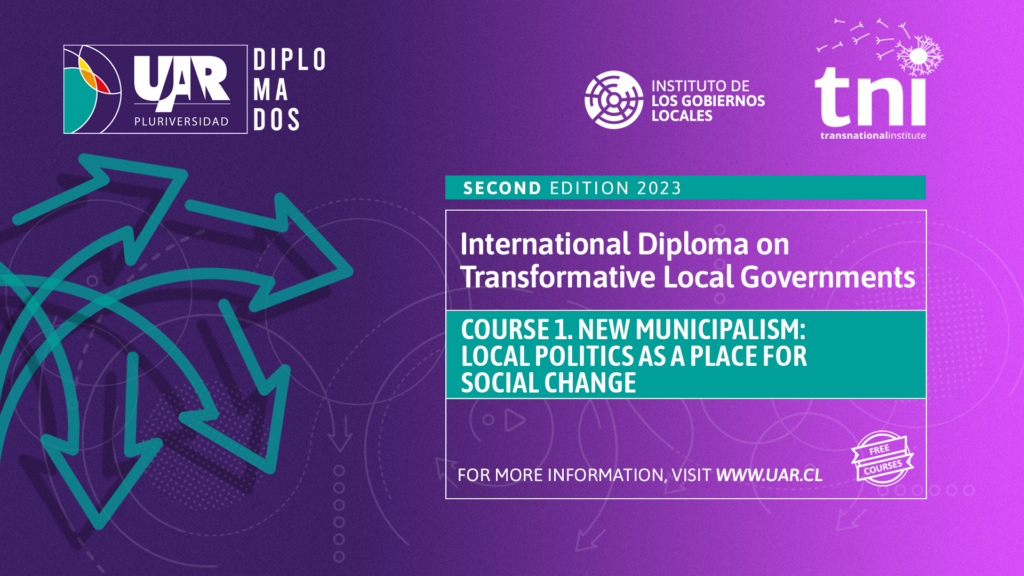New Municipalism: Local Politics as a Place for Social Change - Second edition
The Universidad Abierta of Recoleta, together with the Transnational Institute (TNI) and Common Police, present the first course of the Transformative Local Governments Internacional Diploma in its second edition.
Municipalism is fundamental when it comes to asking ourselves the question about the new strategic role that local governments play in social transformations. Although in recent years electoral disputes at the local level have become more relevant, the discussion around municipalism has a long history, with references and experiences throughout the world.
The challenges we face in the 21st century have updated the discussions, highlighting new issues, such as the treatment of the climate crisis at the local and translocal level, what it means to carry out a feminist municipal project, and how we are capable of having a framework of action in which the original peoples are included.

Students will study the history and the different trends regarding municipalism, and how municipalist values and practices have contributed towards the well-being of cities and communities.

Aimed at public officials, representatives and members of political parties, unions, civil society organisations, and the general public. 15 years old minimum, internet connection and any smart electronic device.

Since these courses are carried out remontely and asynchronously, there is no maximum number of places for them; however, limited dates have been set to sign up for each one.

The course will be certified by all parties involved in the development of this course, as long as the approval requirements are met.

The UAR courses have no cost of any kind for the participants.
Application start date
Tuesday 24th of January, 2023
Minimum quota
100 participants
Course start date
Thursday 30th of March, 2023 at 17:00 (Chile time)
Estimated dedication time per week
6 hours
Registration deadline
Wednesday, 12th of April, 2023 up to 23:59 (Chile time)
Language
English
Course duration
Five weeks
Platform
UAR Digital
Teachers and experts
 Edurne has a PhD in Social Anthropology, specialising in Water, Society and Culture for the Centro de Investigaciones y Estudios Sociales en Antropología Social (CIESAS, México). Her doctoral thesis analysed the remunicipalisation of water, using Terrassa as a case study. Her work is focused around three subjects: social models, management and regulation of water, from public policy to the impact of management models in local populations; analysis of institutions and water as a commons, and new government practices around water and services; and the relationship between democracy, commons and sustainability in the framework of an ecosocial transition. She collaborates with the UNESCO Chair on Sustainable Human Development of the Universidad de Girona, and has participated in OAT since its inception.
Edurne has a PhD in Social Anthropology, specialising in Water, Society and Culture for the Centro de Investigaciones y Estudios Sociales en Antropología Social (CIESAS, México). Her doctoral thesis analysed the remunicipalisation of water, using Terrassa as a case study. Her work is focused around three subjects: social models, management and regulation of water, from public policy to the impact of management models in local populations; analysis of institutions and water as a commons, and new government practices around water and services; and the relationship between democracy, commons and sustainability in the framework of an ecosocial transition. She collaborates with the UNESCO Chair on Sustainable Human Development of the Universidad de Girona, and has participated in OAT since its inception.

Paulina is an activist and researcher on subjects such as democracy, and the right to the city. She has a Master’s degree in Political Analysis and Institutional Assessment from the Universidad de Barcelona and a Master’s degree in Urban and Metropolitan Studies from the Universidad Autónoma de Barcelona. She collaborates with Ciudad Constituyente, the European Municipalist Network and Commons Polis.
 Sam is Coordinator of the International Program for Economic Justice and Resistance to Neoliberalism. Works with Friends of the Earth, Australia. Before joining Friends of the Earth International, he worked in environmental and social justice movements for more than a decade, as union organiser, trainer in citizen media, and as an activist with the Australian Student Environment Network. He was a member of the Take the Square collective, working with the Indignados y Occupy movements. He recently worked on the environmental justice campaign with Friends of Earth, Australia.
Sam is Coordinator of the International Program for Economic Justice and Resistance to Neoliberalism. Works with Friends of the Earth, Australia. Before joining Friends of the Earth International, he worked in environmental and social justice movements for more than a decade, as union organiser, trainer in citizen media, and as an activist with the Australian Student Environment Network. He was a member of the Take the Square collective, working with the Indignados y Occupy movements. He recently worked on the environmental justice campaign with Friends of Earth, Australia.
 David has a degree in Sociology from the École Normale Supérieure, Cachan, France. At the moment he is working for a doctorate in Sociology at the Université Paris Nanterre, studying the new public-commons synergies between municipalism and social movements in Barcelona, drawn from an ethnography by the Platform for People Affected by Mortgages. XXXX collaborates with the Economic, Social,Cultural and Environmental Rights Observatory (Observatori DESC) and is a member of the Communal Action Office. He coordinated, with Ana Méndez de Andés and Marco Aparicio, the book Urban Commons Codes. Tools for the common future of cities (Icaria, 2020).
David has a degree in Sociology from the École Normale Supérieure, Cachan, France. At the moment he is working for a doctorate in Sociology at the Université Paris Nanterre, studying the new public-commons synergies between municipalism and social movements in Barcelona, drawn from an ethnography by the Platform for People Affected by Mortgages. XXXX collaborates with the Economic, Social,Cultural and Environmental Rights Observatory (Observatori DESC) and is a member of the Communal Action Office. He coordinated, with Ana Méndez de Andés and Marco Aparicio, the book Urban Commons Codes. Tools for the common future of cities (Icaria, 2020).
 Ana is an urban architect and teacher, and has a Master’s in Urban Studies and Social Research, with broad experience in militant research-action. She has participated in workshops and presentations in a wide variety of places for the exchange of knowledge, institutional and social, and has written articles on urban transformation, public spaces, and the (re)production of commons. She is a member of the municipalist platform Ahora Madrid (Madrid Now) and consultant to the Madrid City Council, and coordinator of the European Municipalist Network. She is currently writing her doctoral thesis Becoming-Common of the Public in the United Kingdom and participates in the Communal Actions Office.
Ana is an urban architect and teacher, and has a Master’s in Urban Studies and Social Research, with broad experience in militant research-action. She has participated in workshops and presentations in a wide variety of places for the exchange of knowledge, institutional and social, and has written articles on urban transformation, public spaces, and the (re)production of commons. She is a member of the municipalist platform Ahora Madrid (Madrid Now) and consultant to the Madrid City Council, and coordinator of the European Municipalist Network. She is currently writing her doctoral thesis Becoming-Common of the Public in the United Kingdom and participates in the Communal Actions Office.
 Raúl has a degree in Sociology from the Universidad Nacional Autónoma de México, where he also studies a Master’s (intern) in Latin American Studies. Currently he is Technical-Academic at the Instituto de Investigaciones Sociales of the UNAM and Academic Secretary of the site Conceptos y Fenómenos Fundamentales de Nuestro Tiempo (Concepts and Fundamental Phenomenon of our Times – http://conceptos.sociales.unam.mx/), coordinated by Dr. Pablo González Casanova. He frequently writes for the Mexican newspaper La Jornada and has published different essays about the Zapatista Army of National Liberation, some of which have been translated into different languages. His subjects of interest are anti capitalism, social and environmental resistance movements, emancipatory processes, autonomies and criminal economies.
Raúl has a degree in Sociology from the Universidad Nacional Autónoma de México, where he also studies a Master’s (intern) in Latin American Studies. Currently he is Technical-Academic at the Instituto de Investigaciones Sociales of the UNAM and Academic Secretary of the site Conceptos y Fenómenos Fundamentales de Nuestro Tiempo (Concepts and Fundamental Phenomenon of our Times – http://conceptos.sociales.unam.mx/), coordinated by Dr. Pablo González Casanova. He frequently writes for the Mexican newspaper La Jornada and has published different essays about the Zapatista Army of National Liberation, some of which have been translated into different languages. His subjects of interest are anti capitalism, social and environmental resistance movements, emancipatory processes, autonomies and criminal economies.
 Laura is an Argentine born researcher and activist. Former member of Barcelona en Comú, lives in the Basque country and works as a researcher and consultant on subjects such as municipalism, feminism, participative democracy and political culture. She has spoken in seminars in more than 10 countries and writes for ElDiario.es, ROAR Magazine and Open Democracy. One of her most recent publications is the book Democratic Cities (Icaria) and the report Feminize Politics Now! (Rosa Luxemburg Foundation), available in English, German, Serbo-Croatian, and soon to be published in Spanish and French.
Laura is an Argentine born researcher and activist. Former member of Barcelona en Comú, lives in the Basque country and works as a researcher and consultant on subjects such as municipalism, feminism, participative democracy and political culture. She has spoken in seminars in more than 10 countries and writes for ElDiario.es, ROAR Magazine and Open Democracy. One of her most recent publications is the book Democratic Cities (Icaria) and the report Feminize Politics Now! (Rosa Luxemburg Foundation), available in English, German, Serbo-Croatian, and soon to be published in Spanish and French.

Emilio has a PhD in Social Anthropology and is an ecosocial activist. He is Head Scientist of the Anthropology Department at the Spanish National Research Council. Between 2016 and 2019 he was the Technical Director for the Environment in the city of Móstoles, driving forward the Móstoles Transita 2030 project. In 2020 he was the technical advisor on ecological issues for Más Madrid and Más País in the Madrid Assembly/Congress of Deputies, and authored the books Mapless Routes ( Winner of the Ensayo Catarata prize, 2015) and What to do in case of fire? A manifest for a Green New Deal, co-authored with Héctor Tejero.
 Caren is a member and founding president of the political party Ciudad Futura and councilperson since 2015. She presides the group of councilpersons for the party in the Municipal Council of the City of Rosario, Argentina, and creator of the Feminisms and Dissidences Commission, which she presided from 2019 to 2021.
Caren is a member and founding president of the political party Ciudad Futura and councilperson since 2015. She presides the group of councilpersons for the party in the Municipal Council of the City of Rosario, Argentina, and creator of the Feminisms and Dissidences Commission, which she presided from 2019 to 2021.
Academic coordination
 Degree in Audiovisual Communication, Audiovisual Communicator specializing in Scriptwriting for Film and Television, and Diploma in Transmedia from the University of Arts, Sciences and Communication. Diploma in Film Screenwriting from the University of Chile. Current academic assistant and teaching coordinator of non-presential courses at the Universidad Abierta de Recoleta.
Degree in Audiovisual Communication, Audiovisual Communicator specializing in Scriptwriting for Film and Television, and Diploma in Transmedia from the University of Arts, Sciences and Communication. Diploma in Film Screenwriting from the University of Chile. Current academic assistant and teaching coordinator of non-presential courses at the Universidad Abierta de Recoleta.
 Research Associate for the Transformative Cities Award and the Atlas of Utopias, Transnational Institute (TNI), Amsterdam. He is the Academic Coordinator of the International Diploma on Transformative Local Governments UAR-TNI. He has a PhD in Government and Public Administration, Complutense University, Madrid, and Master in Development, Innovation and Change, University of Bologna, Italy. He is currently visiting researcher at the Centre for Latin American Studies, University of Copenhagen.
Research Associate for the Transformative Cities Award and the Atlas of Utopias, Transnational Institute (TNI), Amsterdam. He is the Academic Coordinator of the International Diploma on Transformative Local Governments UAR-TNI. He has a PhD in Government and Public Administration, Complutense University, Madrid, and Master in Development, Innovation and Change, University of Bologna, Italy. He is currently visiting researcher at the Centre for Latin American Studies, University of Copenhagen.




